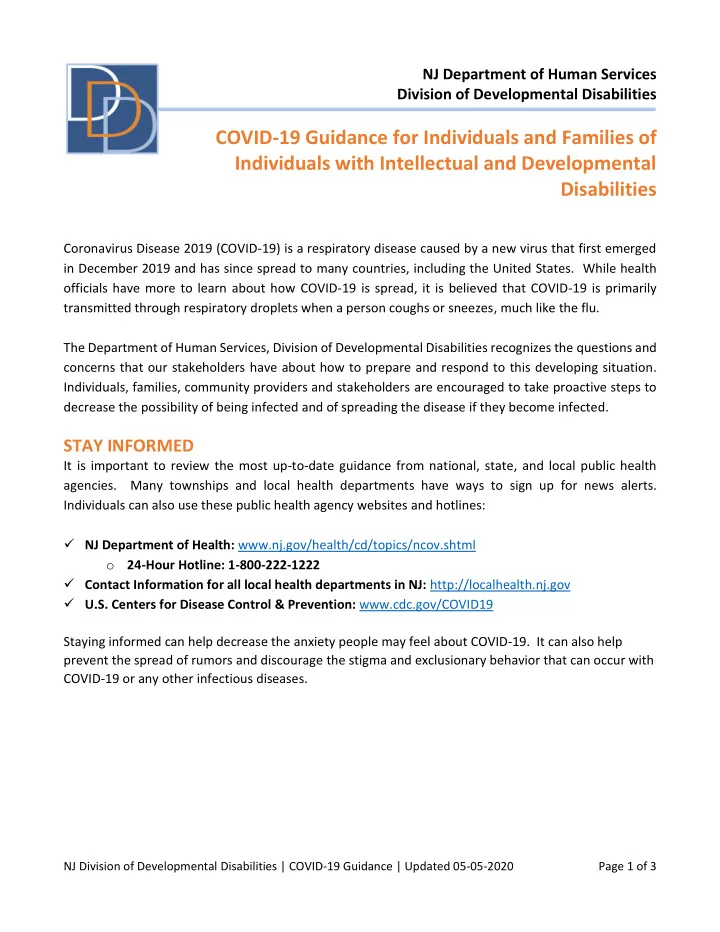

NJ Department of Human Services Division of Developmental Disabilities COVID-19 Guidance for Individuals and Families of Individuals with Intellectual and Developmental Disabilities Coronavirus Disease 2019 (COVID-19) is a respiratory disease caused by a new virus that first emerged in December 2019 and has since spread to many countries, including the United States. While health officials have more to learn about how COVID-19 is spread, it is believed that COVID-19 is primarily transmitted through respiratory droplets when a person coughs or sneezes, much like the flu. The Department of Human Services, Division of Developmental Disabilities recognizes the questions and concerns that our stakeholders have about how to prepare and respond to this developing situation. Individuals, families, community providers and stakeholders are encouraged to take proactive steps to decrease the possibility of being infected and of spreading the disease if they become infected. STAY INFORMED It is important to review the most up-to-date guidance from national, state, and local public health agencies. Many townships and local health departments have ways to sign up for news alerts. Individuals can also use these public health agency websites and hotlines: NJ Department of Health: www.nj.gov/health/cd/topics/ncov.shtml o 24-Hour Hotline: 1-800-222-1222 Contact Information for all local health departments in NJ: http://localhealth.nj.gov U.S. Centers for Disease Control & Prevention: www.cdc.gov/COVID19 Staying informed can help decrease the anxiety people may feel about COVID-19. It can also help prevent the spread of rumors and discourage the stigma and exclusionary behavior that can occur with COVID-19 or any other infectious diseases. NJ Division of Developmental Disabilities | COVID-19 Guidance | Updated 05-05-2020 Page 1 of 3
PRACTICE BASIC PREVENTION MEASURES Follow these basic preventive measures at home, work, and program settings: Hand washing and disinfecting of frequently-used surfaces are two of the most important things that we can all do to protect ourselves and prevent the spread of the disease. o Wash hands frequently with soap and water for at least 20 seconds, especially before eating; after going to the bathroom; and after blowing your nose, coughing, or sneezing. o When soap and water are unavailable, use a hand sanitizer that contains at least 60% alcohol. o Review the CDC’s detailed recommendations for homes, healthcare facilities and other settings: https://www.cdc.gov/handwashing/when-how-handwashing.html o Clean and disinfect frequently-used surfaces and objects using EPA SARS-CoV-2 approved products, following label instructions on use and contact time: https://www.epa.gov/pesticide-registration/list-n-disinfectants-use-against-sars-cov-2 Avoid touching eyes, nose, and mouth with unwashed hands. Cover nose and mouth with a tissue when coughing or sneezing, and then throw the tissue into a trashcan. Wash hands after doing this. Review the CDC’s guidance on what to do if you have a respiratory infection, like COVID -19 or the flu, or are in contact with an individual who does: https://www.cdc.gov/coronavirus/2019- ncov/community/index.html PLAN AND PREPARE Planning and preparation are the best tools for preventing someone from being infected or from spreading the disease if they become infected. As always, maintain extra food and water at home in case your usual routine must change. For individuals taking prescription medications, ensure there are refills available. If not, contact your health care provider, pharmacist, or insurer to obtain. Make sure you have a working thermometer and over-the-counter medications like decongestants, expectorants, and analgesics (ibuprofen, acetaminophen). If possible, identify a room or area of the household that can be used to separate someone who is sick. A health care provider may make this recommendation based on the person’s diagnosis . Make sure you have a backup plan in place in case an individual’s primary caregivers or support staff are unable to provide care. Talk to family, relatives, and friends about how they can help. Create an emergency list with information for local health officials, community organizations, individuals, family members and friends who may need to be reached in an emergency. Ask employers and service providers about what plans they have in place if an employee or program participant is suspected or confirmed of having COVID-19. Plan for the possibility that events, services and programs may be modified or cancelled. NJ Division of Developmental Disabilities | COVID-19 Guidance | Updated 05-05-2020 Page 2 of 3
SIGNS AND SYMPTOMS COVID-19 presents with signs and symptoms that may be indistinguishable from much more common respiratory viruses. At this time, respiratory illnesses are still more likely to be due to common viruses (e.g., influenza, common cold) than COVID-19. If a community has cases of COVID-19, local health officials will help identify those individuals and will follow up on next steps. UPDATED 05-05-2020 Symptoms may appear 2-14 days after exposure to the virus. People with these symptoms or combinations of symptoms may have COVID-19: Cough Shortness of breath or difficulty breathing Or at least two of the following symptoms: Fever Chills Repeated shaking with chills Muscle pain Headache Sore throat New loss of taste or smell For the most up-to-date COVID-19 sign and symptoms, please go to the CDC ’ s symptom page: www.cdc.gov/coronavirus/2019-ncov/symptoms-testing/symptoms.html WHAT TO DO IF SOMEONE HAS SYMPTOMS Contact a health care professional if you, an employee, or an individual in your care develops these symptoms — especially if they have been in close contact with a person who has travelled internationally in the last 14 days or with a person who is known to have COVID-19; or if they live in or have recently been in an area with ongoing spread of COVID-19. NJ Division of Developmental Disabilities | COVID-19 Guidance | Updated 05-05-2020 Page 3 of 3
Recommend
More recommend